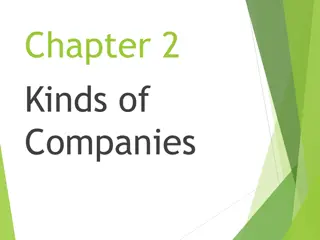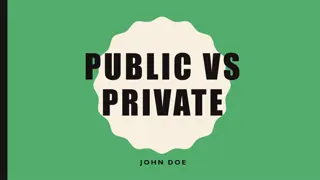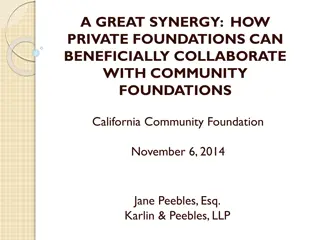
Understanding the Public and Private Sectors in Business Administration
Explore the differences between the public and private sectors in business administration, their roles in the economy, and the impact they have on society's welfare and economic growth. Delve into concepts such as privatization, profit motives, job security, and service quality to gain insights into how these sectors function and contribute to national development.
Download Presentation

Please find below an Image/Link to download the presentation.
The content on the website is provided AS IS for your information and personal use only. It may not be sold, licensed, or shared on other websites without obtaining consent from the author. If you encounter any issues during the download, it is possible that the publisher has removed the file from their server.
You are allowed to download the files provided on this website for personal or commercial use, subject to the condition that they are used lawfully. All files are the property of their respective owners.
The content on the website is provided AS IS for your information and personal use only. It may not be sold, licensed, or shared on other websites without obtaining consent from the author.
E N D
Presentation Transcript
Libyan International Medical University Faculty Of Business Administration THE PUBLIC SECTOR AND PRIVATE SECTOR Presented By : Ayub El Mesmary I D Number : 2298 PBL : Week 3 Group 6 E-Mail : ayoub_2298@limu.edu.ly 1
CONTENT Introduction What Is the Public Sector ? What Is the Private Sector ? What is the Difference Between the Public Sector and the Private Sector ? Comparison Conclusion Reference 2
INTRODUCTION Gone are the days, when only the Public Sector was prevalent in the economy. At present, many countries have adopted the policy of Privatization, through which Private Sector is also gaining importance. For the progress and development of any country, both the sectors must go hand in hand as only one sector cannot lead the country in the path of success. 3
PUBLIC SECTOR The Public Sector is usually comprised of organizations that are owned and operated by the government and exist to provide services for its citizens. Similar to the voluntary sector, organizations in the public sector do not seek to generate a profit. 4
PRIVATE SECTOR The private sector is the part of the economy that is run by individuals and companies for profit and is not state controlled. Therefore, it encompasses all for- profit businesses that are not owned or operated by the government 5
DIFFERENCE BETWEEN THE PUBLIC SECTOR & THE PRIVATE SECTOR BASIS FOR COMPARISON PUBLIC SECTOR PRIVATE SECTOR Meaning The section of a nation's economy, which is under the control of government, whether it is central, state or local, is known as the Public Sector. The section of a nation's economy, which owned and controlled by private individuals or companies is known as Private Sector. Basic objective To serve the citizens of the country. Public Revenue like tax, duty, penalty etc. Earning Profit Raises money from Issuing shares and debentures or by taking loan 6
COMPARISON Public Sector Private Sector Unlimited jobs Insecure the jobs Unlimited works/ day Unlimited age of services Only for earning profit Fast/good service Employees can get bonuses Limited jobs Secure jobs Limited day Limited age of services Only for social welfare No good services Salaries only 7
Nowadays, Private Sector is progressing faster because promotes quality, not quantity; it encourages talent. Public Sector is full of reservations like reservations for minority section, females, a person with a disability and much more, here nobody sees talent, it is completely ignored and because of this, competent youths remain unemployed. CONCLUSION 8
"public sector".Investorwords, WebFinance, Inc. 2016. ^ "The Center for Responsive Politics." OpenSecrets.org. Center for Responsive Politics, 16 May 2017. Web. 11 June 2017. ^ Rothbard, M. N. (1961). The fallacy of the public sector. . The Logic Of Action Two, Application and Criticism from the Austrian School. ^ ibid ^ Murray N. Rothbard (May 1998). "The Moral Status of Relations to the State", chapter 24 of The Ethics of Liberty. Humanities Press 1982, New York University Press 1998.ISBN 978-0-8147-7506-6. ^ Ellickson, R. C. (2017). A Hayekian Case Against Anarcho-Capitalism: Of Street Grids, Lighthouses, and Aid to the Destitute. NYUJL & Liberty, 11, 371 REFERENCE 9
Presented By Ayub El Mesmary The End Saturday, May 10, 2025 10






















